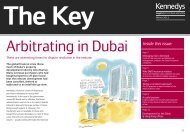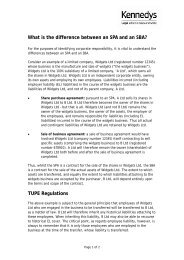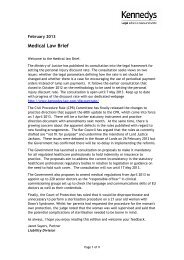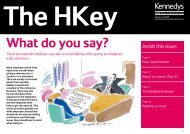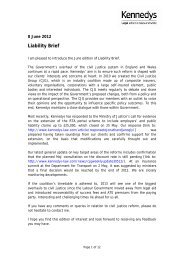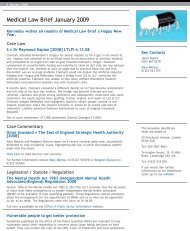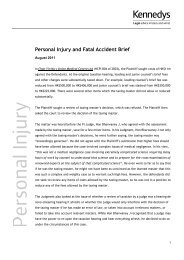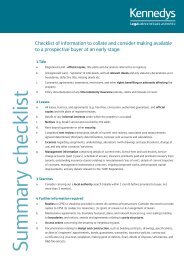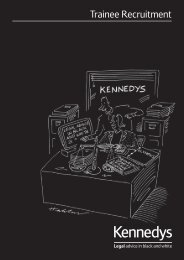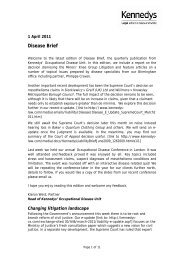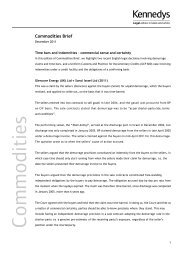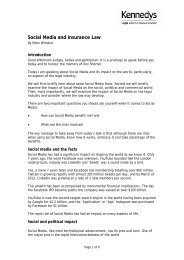Download Hong Kong Key - Summer 2009 (PDF, 256KB). - Kennedys
Download Hong Kong Key - Summer 2009 (PDF, 256KB). - Kennedys
Download Hong Kong Key - Summer 2009 (PDF, 256KB). - Kennedys
You also want an ePaper? Increase the reach of your titles
YUMPU automatically turns print PDFs into web optimized ePapers that Google loves.
The H<strong>Key</strong> <strong>Summer</strong><br />
<strong>2009</strong><br />
Directors’ criminal liability<br />
Directors may be criminally liable for a company’s attempted breach of the Securities and<br />
Futures Ordinance.<br />
The Court of Final Appeal has established<br />
a key principle about directors’ criminal<br />
liability in its recent decision in To Shu<br />
Fai v Securities and Futures Commission<br />
[<strong>2009</strong>] HKCU 423. The court ruled<br />
that where a company is found guilty<br />
of attempting to commit an offence<br />
in breach of section 384(1) of the<br />
Securities and Futures Ordinance (SFO)<br />
by providing the Stock Exchange of <strong>Hong</strong><br />
<strong>Kong</strong> (SEHK) with false and misleading<br />
information, a director of the company is<br />
also criminally liable by virtue of section<br />
390 of the SFO.<br />
Factual background<br />
The case arose out of a series of<br />
events that led to the sale of a<br />
large volume of shares in Daido<br />
Group Ltd (Daido) by its chairman<br />
and director, Mr To Shu Fai (Mr<br />
To), and a subsequent public<br />
announcement issued by Daido<br />
in relation to share trading on the<br />
day of the share sale.<br />
Mr To had a controlling interest<br />
in Top Search Synergy Associates<br />
Ltd (Top Synergy), which was a<br />
holding company that existed<br />
for the sole purpose of<br />
holding shares in Daido. In the<br />
summer of 2003, Mr To (through<br />
Top Synergy) obtained a loan of<br />
HK$90m from TKR Finance, which<br />
Inside this issue:<br />
Page 3<br />
Take Note!<br />
New Appointments<br />
Page 4<br />
The Rotterdam rules<br />
A new era for international trade<br />
– probably<br />
Page 6<br />
The jeweller<br />
Page 7<br />
Reinsurers reassured<br />
1
he used to acquire a controlling interest in Daido. As<br />
transaction had taken place.<br />
• Section 390 of the SFO imposed an accessory or<br />
Mr To’s appeal was therefore dismissed. His conviction<br />
security, TKR Finance held a charge over all the shares<br />
concurrent liability on an officer of a company that<br />
and fine of HK$50,000 were upheld. He was also<br />
acquired.<br />
The company secretary then told SEHK that none<br />
was found guilty of an SFO offence. So because<br />
ordered to pay the SFC’s investigation costs of<br />
of the directors had traded shares that day. He was<br />
Daido was liable, Mr To (as a director of Daido) was<br />
HK$15,166.<br />
In order to reduce Top Synergy’s exposure to the loan,<br />
TKR Finance’s director Victor Chan requested that Mr<br />
To reduce the debt by between HK$10m-HK$20m by<br />
selling some of the shares in Daido. A discussion then<br />
took place in July or August 2003 between Victor<br />
Chan and Mr To regarding the sale of approximately<br />
200 million shares. Mr To said that he could arrange<br />
for some of his friends to buy the shares. During a<br />
further discussion in early October 2003, Victor Chan<br />
again pressed Mr To to sell the shares in order to<br />
repay a portion of the loan and urged him to conclude<br />
the sale quickly, and preferably by the end of October.<br />
Share sale and non-disclosure<br />
On 16 October 2003, TKR Finance sold the 200<br />
million shares in Daido to three buyers. The proceeds<br />
of the sale were paid to TKR Finance the following<br />
day. However, Victor Chan did not immediately<br />
inform Mr To of the transaction. The sale of the 200<br />
million shares – as seen against the daily average of<br />
about 350,000 shares over the previous 10 days –<br />
attracted the attention of the SEHK.<br />
During the afternoon of 16 October, the company<br />
secretary was asked about the high turnover of<br />
Daido’s shares that day. He was specifically requested<br />
to ask all the directors whether any of them had<br />
bought or sold shares that day, and whether they<br />
knew of anything disclosable under the Listing Rules.<br />
When the company secretary asked Mr To, he replied<br />
that he did not trade any shares that day, and did not<br />
refer to the proposed sale of the 200 million shares<br />
he had previously discussed with Victor Chan. It did<br />
not occur to him to ask TKR Finance whether the<br />
asked to issue a public announcement to that effect.<br />
The announcement dated 16 October 2003 was filed<br />
with the SEHK, stating that Daido’s board of directors<br />
noted the large volume of share trading that day but<br />
did not know any reason for the increase in trading<br />
volume. The announcement was published on the<br />
website of the SEHK the same day.<br />
Dual filing<br />
Whenever a listed company files a copy of any<br />
announcement, statement or circular with the SEHK,<br />
it must make the same filing with the Securities and<br />
Futures Commission (SFC). The company may, by<br />
written authorisation, permit the SEHK to file any<br />
announcement, statement or circular on its behalf<br />
with the SFC. This is known as the “dual filing scheme”.<br />
Earlier that year, Daido had given the SEHK a blanket<br />
written authorisation to file any public announcement,<br />
statement or circulars with the SFC. However, on<br />
this occasion, the SEHK did not file the 16 October<br />
announcement with the SFC.<br />
Magistrates’ court ruling<br />
The first hearing was in the magistrates’ court. Mr<br />
Douglas TH Yau, the magistrate, came to the following<br />
conclusions:<br />
• Daido (via Mr To) knew – or should have known<br />
– that the sudden increase in the trading volume<br />
of its shares was the result of the sale of the 200<br />
million shares. Consequently, Daido was guilty of<br />
an offence under section 384(1) of the SFO for<br />
providing false or misleading information to the<br />
SFC.<br />
also criminally liable for the same offence.<br />
• Alternatively, even if the substantive offence under<br />
section 384(1) was not completed – that is to<br />
say, even if the 16 October announcement had<br />
only been given to the SEHK and not to the SFC –<br />
Daido would still be guilty of an attempt to commit<br />
the offence. Consequently, Mr To would also incur<br />
criminal liability by virtue of section 390.<br />
The appeal<br />
Daido and Mr To appealed to the Court of First<br />
Instance on various grounds. However, Madam<br />
Justice Beeson dismissed their appeal and upheld the<br />
magistrate’s decision on both the substantive and<br />
attempted offences. Mr To then appealed to the Court<br />
of Final Appeal, which reaffirmed the decision of the<br />
magistrate. The court made two important rulings:<br />
(1) As it had behaved recklessly, Daido would have<br />
been guilty of an attempt even if it had not<br />
been convicted of the full offence under section<br />
384(1).<br />
(2) An attempt to commit an offence is itself an<br />
offence under section 159H of the Crimes<br />
Ordinance. Mr To would have been criminally<br />
liable for Daido’s attempt to commit the section<br />
384(1) offence. This was due to the combined<br />
effect of sections 159H and 159G of the Crimes<br />
Ordinance, which modified section 390 of the<br />
SFO so as to impose an accessory or concurrent<br />
liability on a corporate officer for the company’s<br />
attempt to commit an offence under the SFO.<br />
The lessons of the case<br />
The criminal convictions of Daido and Mr To were the<br />
first successful prosecutions for providing false and<br />
misleading information under the dual filing scheme.<br />
The SFC’s executive director of enforcement, Mr<br />
Mark Steward, welcomed the decision and said: “The<br />
case provides authoritative confirmation that criminal<br />
prosecution is a real rather than theoretical risk. The<br />
decision will pave the way for more enforcement<br />
action, where appropriate, against listed companies<br />
and their directors who provide false or misleading<br />
information to the SFC or the SEHK”.<br />
The lesson to be learnt from this case is that not only<br />
can companies be convicted of attempting to commit<br />
an offence under the SFO, but that directors may also<br />
be found criminally liable for the same offence.<br />
Chris Sharrock<br />
Partner<br />
c.sharrock@kennedys.com.hk<br />
Jenny Zhuang<br />
Solicitor<br />
j.zhuang@kennedys.com.hk<br />
2
Take Note!<br />
In <strong>Hong</strong> <strong>Kong</strong>, Notaries are lawyers who<br />
specialise in international transactions<br />
and documentation for use outside<br />
<strong>Hong</strong> <strong>Kong</strong>. Nearly all of them practice<br />
as solicitors in addition to their Notarial<br />
practice.<br />
The office of Notary Public has a long and<br />
distinguished history and its origins can be traced<br />
back to ancient Rome. Most scribae, as they were<br />
then called, began as mere copiers and transcribers,<br />
before rising to prominent public office and advising<br />
in private/public affairs. Some scribae had duties in<br />
the Senate and Courts of Law in which they recorded<br />
public proceedings, state papers and registered<br />
decrees and judgments of the magistrates.<br />
In <strong>Hong</strong> <strong>Kong</strong>, a Notary Public must be a qualified<br />
solicitor, with at least 7 years’ experience and must<br />
pass a rigorous examination set by the <strong>Hong</strong> <strong>Kong</strong><br />
Society of Notaries. In November 2005, of the<br />
136 solicitors who sat the exam, only 29 passed!<br />
Notaries are required to have a good knowledge of<br />
international law, conflicts of law, Notarial theory and<br />
practices; they must also have training as Notaries,<br />
in addition to any training they may have had as<br />
solicitors. After qualification, the Notary designs his<br />
own seal which is registered with the High Court<br />
in <strong>Hong</strong> <strong>Kong</strong> and the various Consulates. He is<br />
also required to keep a log or ledger of the various<br />
people who come before him to authenticate their<br />
transactions or identities, etc.<br />
When providing an affidavit, declaration or any<br />
formally sworn document to an overseas Court, it is<br />
In recent years, the need for Notaries has grown<br />
significantly, due to the internationalisation of markets<br />
generally and consequently for legal services. Banks<br />
often insist on a Notary for loan signing and other<br />
transactions where money is exchanged, especially in<br />
the purchase of overseas properties.<br />
We at <strong>Kennedys</strong> in <strong>Hong</strong> <strong>Kong</strong> have our own Notary<br />
Public. Please direct all enquiries to Mr. Nigel Bacon,<br />
Partner, who has been qualified as a Notary Public<br />
since 1989.<br />
Nigel Bacon<br />
Partner<br />
n.bacon@kennedys.com.hk<br />
+852 2848 6300<br />
New Appointments<br />
Anthony Woo, Partner<br />
John Yiu, Consultant<br />
Vanessa Liu, Solicitor<br />
Jenny Zhuang, Solicitor<br />
I am delighted to welcome to back Anthony<br />
to <strong>Kennedys</strong> to head up our Maritime and<br />
International Trade practice. Anthony will<br />
work with Vanessa, a shipping specialist,<br />
who recently joined us. I would also like to<br />
welcome John and Jenny to <strong>Kennedys</strong> and<br />
wish them every success in the future.<br />
The title notarius was adopted for this respected<br />
position when a new form of shortand was invented,<br />
called notae. Notarius was later applied exclusively<br />
to those in the employ of high government officials,<br />
including governors and secretaries to the Emperor.<br />
In England, Notaries were originally appointed by the<br />
Papal Legate and the majority of the members were<br />
therefore clergymen. Later, the power to appoint<br />
Notaries was vested in the King and devolved to the<br />
Master of Faculties, giving rise to the modern Notary<br />
Public.<br />
generally necessary to procure a Notary’s signature<br />
and seal to indicate that you are, in fact, who you<br />
say you are on the document. Contracts often<br />
require a Notary for the same reason. Wills, trusts,<br />
and powers of attorney also in many countries<br />
require a Notary’s signature and seal. Essentially,<br />
trust is placed internationally on the Notary to<br />
properly identify and authenticate the individuals<br />
concerned. All fees charged by the Notary are laid<br />
down by the Society of Notaries in a recommended<br />
scale of charges.<br />
Denise Pong<br />
Trainee Solicitor<br />
d.pong@kennedys.com.hk<br />
Rupert Skrine<br />
Senior Partner<br />
r.skrine@kennedys.com.hk<br />
3
The Rotterdam rules<br />
A new era for international trade – probably<br />
After six years of intergovernmental<br />
negotiations, the United Nations General<br />
Assembly has finally adopted the United<br />
Nations Convention on Contracts for<br />
the International Carriage of Goods<br />
Wholly or Partly by Sea, also known as<br />
the “Rotterdam rules” (the Rules). It has<br />
scheduled a signing ceremony for the new<br />
convention to take place on 23 September<br />
<strong>2009</strong> in Rotterdam. Before it can come<br />
into force, however, the new convention<br />
There are several significant changes. For certain<br />
carriers, the Rules will apply door-to-door. The<br />
Rules also attempt to strike a fair balance of risks<br />
between carriers and cargo interests by removing<br />
the “navigational fault” exception, increasing the<br />
package/weight limitation and enhancing time<br />
limitation for cargo claims. Other reforms are designed<br />
to accommodate changing shipping practice. The<br />
most significant reform is probably<br />
the introduction of a “volume<br />
contract” exception, which<br />
permits the contracting<br />
carrier to disregard the<br />
what is known as “wet multimodal transportation”<br />
in order to accommodate contracts of carriage<br />
and insurance agreements that are nowadays<br />
mainly concluded on a door-to-door basis. This is<br />
a significant change from existing law, since most<br />
current international regimes apply on a tackleto-tackle<br />
or port-to-port basis. Although the Rules<br />
would facilitate door-to-door transportation, the<br />
parties will still be able to opt-out of the inland leg<br />
of carriage (by truckers and railroads), so that the<br />
Rules will only apply to the sea leg.<br />
requires ratification by at least 20 nation<br />
member states, and no reservations<br />
Rules almost in their<br />
entirety.<br />
are permitted (except as regards the<br />
provisions relating to jurisdiction and<br />
arbitration, which are subject to express<br />
affirmation). In addition, ratifying states<br />
must discard earlier conventions.<br />
The key<br />
changes<br />
This article highlights the<br />
key changes made by<br />
the Rules and compares<br />
The Rules consist of 96 articles packaged in 18<br />
chapters, and aim to replace the existing patchwork<br />
of conventions and conflicting national laws that have<br />
grown up in the absence of a multimodal transport<br />
agreement. The new convention aims to offer the<br />
possibility of a jurisprudential environment in which<br />
international maritime trade can develop in such a<br />
way as to allow traders to govern their transactions in<br />
a more predictable and consistent manner.<br />
them with the existing<br />
international conventions.<br />
• Door-to-door<br />
transportation<br />
coverage.<br />
The Rules<br />
were primarily<br />
designed to<br />
govern the liability<br />
of carriers providing<br />
4
• Volume contract. Current legal regimes such as<br />
the Carriage of Goods by Sea Act 1971 (COGSA)/<br />
Hague-Visby rules and the Hamburg rules give<br />
the parties a degree of freedom of contract<br />
– for example, the right to exempt expressly<br />
contracts of affreightment. However, the Rules<br />
extend this freedom to allow parties to conclude<br />
a volume contract, enabling them (subject to<br />
certain conditions) to opt-out of almost all the<br />
responsibilities of carriers and shippers covered<br />
in a contract of carriage, and to derogate from<br />
the Rules. Put simply, contracting parties can<br />
(with a few exceptions) essentially disregard the<br />
Rules altogether. A “volume contract” is defined<br />
in the Rules as a single contract of carriage that<br />
specifies the quantity of goods carried in a series of<br />
shipments during an agreed period of time.<br />
This is a significant change because almost all<br />
containerised cargo in the world is presently<br />
transported under service contracts, which are<br />
similar to volume contracts. But unlike service<br />
contracts, volume contracts may (thanks to the<br />
Rules) not have to comply with any international<br />
maritime regimes. This could possibly result in<br />
the transportation of the world’s cargo being<br />
unregulated. In particular, if there are no restrictions<br />
on the use of the volume contract so as to prevent<br />
abuse, there is a risk that small and medium-sized<br />
shippers will be at a serious disadvantage when<br />
contracting with carriers.<br />
• Shippers’ obligations. The Rules recognise that<br />
shippers are in a better position than carriers to<br />
identify risks associated with dangerous shipments.<br />
Consequently, shippers are saddled with a number<br />
of obligations under the new regime, including<br />
the duty to provide information about cargo that<br />
is of a hazardous nature. The Rules also expressly<br />
impose liability on a shipper that breaches these<br />
• Carriers’ liabilities. Carriers have increased<br />
responsibilities under the Rules as a result of the<br />
elimination of the navigational fault exception. This<br />
exception allows a carrier to escape liability for<br />
cargo damage if the loss stems from a navigational<br />
fault or an error in navigation.<br />
The Rules also expressly impose an obligation on<br />
shipowners to ensure that their ships are seaworthy<br />
throughout the voyage, and not just at the start<br />
of the voyage as required under the current law.<br />
Carriers’ bills of ladings will also be prohibited from<br />
excluding liability for cargo damage either pre or<br />
post “ship’s rail” (ie before cargo is loaded on the<br />
ship or after discharge).<br />
Furthermore, the package limitation has been<br />
raised to 835 special drawing rights (SDRs) per<br />
package (equivalent to about US$1,260 per<br />
package) and weight limitation to three SDRs per<br />
kilogram (equivalent to about US$4.44 per kg),<br />
which is a substantial increase from the current<br />
limitations under the COGSA/Hague-Visby rules.<br />
However, the higher package limit can be avoided<br />
if the parties enter into volume contracts. Carriers<br />
may potentially take advantage of the volume<br />
contract in an attempt to escape the increased<br />
liability. Finally, the carriers can be held liable for<br />
delay in delivery if the time for delivery has been<br />
agreed in the contract of carriage.<br />
• Maritime performing parties. The Rules also<br />
introduce new concepts, including “maritime<br />
performing parties”. This means that a carrier’s<br />
employees, agents and independent contractors<br />
will have the rights and obligations enjoyed by the<br />
carrier without the need to include a Himalaya<br />
clause (ie a contractual provision giving benefits<br />
to a third person or entity who is not a party to the<br />
contract) in the transport agreement.<br />
However, all maritime performing parties will be<br />
jointly and severally liable to cargo interests for<br />
cargo claims. This means that, under the new<br />
regime, cargo interests will have several targets<br />
to pursue. This may have a substantial commercial<br />
impact on (for example) terminal operators, who<br />
fall within the definition of “maritime performing<br />
parties”, since they will be forced to accept greater<br />
risk and, as a result, higher insurance spend.<br />
• Time limitation for cargo claims. The Rules<br />
increase the time allowed for a cargo claim to be<br />
filed against the carrier from the standard one year<br />
(beginning with the date of delivery) under the<br />
COGSA/Hague-Visby rules to two years.<br />
• Jurisdiction and arbitration. The provisions on<br />
jurisdiction and arbitration will not apply unless<br />
the adopting state specifically declares that it<br />
will be bound by them. Such a declaration may<br />
be made – and withdrawn – at any time. If the<br />
declaration is not made at the time the Rules come<br />
into force in a particular state, it will take effect<br />
six months after the declaration. The downside of<br />
this freedom to allow a state to choose whether to<br />
adopt the provisions on jurisdiction and arbitration,<br />
or whether to include either or both of them, is<br />
that it will lead to considerable variations between<br />
nations. This will defeat the underlying objective<br />
of the Rules to provide an internationally uniform<br />
regime.<br />
Future of the Rotterdam rules<br />
At this stage, when the Rules have not yet been<br />
signed let alone ratified, no-one can be sure whether<br />
or not the new convention will succeed in establishing<br />
a widely accepted international maritime regime.<br />
Several legal commentators are concerned that the<br />
length and complexity of the Rules may be a source of<br />
litigation, as parties struggle to agree on the precise<br />
meaning of some of the provisions of the convention.<br />
Others are actually lobbying against ratification.<br />
Many uncertainties remain and the fate of the Rules<br />
will depend on several factors, especially on how many<br />
and which countries will ratify the Rules and how<br />
quickly they will come into force. It will only be when<br />
the 20th nation has ratified convention and the Rules<br />
have come into force, that it will be possible to start<br />
assessing their practical impact on international trade.<br />
Anthony Woo<br />
Partner<br />
a.woo@kennedys.com.hk<br />
Vanessa Liu<br />
Solicitor<br />
v.liu@kennedys.com.hk<br />
obligations.<br />
5
The jeweller<br />
Insureds need to be careful if they wish to successfully make a<br />
claim under a policy.<br />
This article examines the recent Court of<br />
Appeal decision of Richfine Development<br />
Ltd t/a Keng Fai Jewellery v Hugh Rupert<br />
Rivington [<strong>2009</strong>] HKCU 583 which<br />
discusses warranty breaches and waivers<br />
of a Lloyds jewellers’ block policy.<br />
When the Policy became due for renewal, Anglo’s<br />
agent visited the office premises of Richfine with a<br />
pre-completed proposal form. During the meeting,<br />
Richfine’s director informed Anglo’s agent that Richfine<br />
was stocking 50% less gold than what was listed in the<br />
original Policy. Anglo’s agent assured the director that<br />
there was no need to amend the proposal form as gold<br />
trading posed less risk and renewed the Policy based<br />
Background<br />
Richfine Development Ltd (Richfine) operated a<br />
on the information provided when the Policy was first<br />
entered into in 1998 (the Renewed Policy).<br />
wholesale jewellery business which took out a Lloyds<br />
jewellers’ block policy with Lloyds Syndicate (HRR),<br />
through a <strong>Hong</strong> <strong>Kong</strong> agent, Anglo East Surety<br />
Limited (Anglo). A jewellers’ block policy is an “all<br />
risk” coverage for hazards and risks involved in the<br />
jewellery industry. As with all policies, the Insurer is<br />
required to list out exclusions for coverage. Typical<br />
risks that are covered in such policies include burglary,<br />
robbery, shoplifting, grab and run, fire and accidental<br />
damage.<br />
The claim<br />
Richfine later made a claim under the Renewal Policy<br />
in the sum of HK$6,199,343 for consequential<br />
loss suffered as a result of a robbery. HRR refused<br />
to pay the claim on the basis that Richfine had<br />
breached a warranty contained in a ‘basis’ clause<br />
of the proposal form which related to the agreed<br />
standards of transactional record keeping. HRR<br />
alleged that “[Richfine]’s records were inadequate…<br />
[Richfine] could not satisfactorily justify any element<br />
Court of first<br />
instance decision<br />
The crux of the issue was<br />
what constituted a ‘proper<br />
record’. At first instance,<br />
the court, taking into<br />
The entering of the policy<br />
In order to facilitate obtaining insurance coverage,<br />
at least two meetings took place between a<br />
representative from Anglo and a director from<br />
Richfine. Thereafter, the director took out policy cover<br />
on behalf of Richfine via Anglo, with HRR for a period<br />
of one year in 1998 (the Policy).<br />
of its claim by producing sufficient contemporary<br />
records supported by invoices and purchase notes…<br />
[Richfine] did not keep proper records… [Richfine]<br />
has been in breach of warranty from the date of the<br />
Proposal Form. Therefore, the policy never incepted<br />
and as a consequence [Lloyds] was never on risk…”.<br />
Accompanying the letter of rejection was a cheque in<br />
the sum of HK$46,700, being the insurance premium<br />
for the Renewal Policy.<br />
consideration the relative<br />
size, family-run nature<br />
and operational practices of Richfine, concluded that<br />
the record keeping methods were “appropriate to the<br />
prevailing circumstances” and held that no warranty<br />
had been breached. The Court of First Instance also held<br />
that the policy was valid because proper record keeping<br />
was not a warranty or condition precedent to liability.<br />
Even if it were a warranty, Anglo, having inspected the<br />
accounting papers, invoices and other documents and<br />
having indicated that Richfine’s related keeping system<br />
was satisfactory when the Policy was entered into, and<br />
being aware that the original system was in operation<br />
and made no indication that this was unsatisfactory<br />
when the Policy was renewed, Anglo (as the Insured’s<br />
agent) had waived any breach of warranty brought<br />
about by Richfine’s substandard record keeping.<br />
6
The court of appeal decision<br />
HRR appealed to the Court of Appeal where the Court<br />
of First Instance decision was reversed. The Court<br />
of Appeal judge held that Richfine had breached the<br />
warranty of keeping proper records and HRR had<br />
not waived the warranty; and as a result dismissed<br />
Richfine’s claim under the Renewed Policy (see<br />
reasoning below).<br />
The extent of the warranty<br />
Richfine argued that proper record keeping could<br />
not be regarded as a warranty in consideration of it<br />
being granted insurance coverage. Tang VP was of<br />
the opinion that proper record keeping in this context<br />
could only mean proper records would be maintained.<br />
Proper record keeping could not be satisfied even if the<br />
Insured honestly believed the records to be proper.<br />
Reinsurers<br />
reassured<br />
The main legal issue on appeal was whether Richfine<br />
was in breach of a warranty, as a condition precedent<br />
to liability, arising by reason of a “basis” clause in the<br />
proposal form.<br />
What is a “basis” clause?<br />
This principle was explained by Viscount Haldane in<br />
Dawsons Ltd v Bonnin (1922). Viscount Haldane<br />
said that “when answers are declared to be the basis<br />
of the contract this can only mean that their truth is<br />
made a condition exact fulfilment of which is rendered<br />
by stipulation foundational to its enforceability… the<br />
insured cannot recover unless he can show that he has<br />
performed his part, for his performance has been made<br />
the condition of performance by the other party”.<br />
Keeping proper records<br />
Tang VP agreed with Branson J in Shoot v Hill<br />
(1936) that “it is the essence of the matter that the<br />
underwriters should, if a claim arises, be able to look at<br />
the book and see whether the man who is claiming so<br />
much for his stock has got the stock and what he paid<br />
for the stock”. Tang VP ruled that the requirement of<br />
proper record keeping had to be viewed in the context<br />
of a proposal for insurance, the commercial purpose<br />
of which was the obtaining of insurance and that the<br />
findings of the learned judge were marred by his view<br />
that the warranty only required proper records for the<br />
Richfine’s family business.<br />
Waiver<br />
Having heard Counsels’ argument, Tang VP concluded<br />
that having the authority to fill in the proposal form<br />
on behalf of an Insured would not clothe the agent<br />
with actual or ostensible authority to waive any<br />
flaw/defect in Richfine’s accounting system. As for<br />
imputation of knowledge, unless Richfine had told the<br />
agent that if a claim arises, the underwriters would not<br />
be able to look at the books and see whether Richfine<br />
had got the stock and what it paid for, the agent could<br />
not be said to have waived the warranty.<br />
Conclusion<br />
This case illustrates that Insureds must be aware<br />
of the extent of the obligations they undertake,<br />
particularly when a breach of those obligations will<br />
prevent the inception of the policy, resulting in refusal<br />
to meet a claim under the insurance policy.<br />
Hailien Tam<br />
Trainee Solicitor<br />
h.tam@kennedys.com.hk<br />
The House of Lords recently handed<br />
down its much-anticipated judgment in<br />
the Lexington v Wasa case. In what is<br />
good news for reinsurers, the appeal was<br />
allowed and clarity provided to reinsurers<br />
on the scope of their back-to-back cover.<br />
Lexington provided property damage cover to the<br />
Aluminium Company of America (Alcoa) between<br />
1st July 1977 and 1st July 1980. Lexington entered<br />
into a contract of reinsurance with Wasa for the same<br />
three-year period. Both the contract of insurance<br />
and reinsurance were losses occurring / occurrence<br />
policies.<br />
Alcoa was ordered by the US Environmental Protection<br />
Agency to remove waste caused by pollution going<br />
back as far as 1942. Following this order Alcoa began<br />
proceedings in the state of Washington against<br />
various insurers who were on cover between 1956<br />
and 1985 seeking a declaration of entitlement to<br />
insurance coverage in respect of the clean up costs.<br />
The Washington Supreme Court held that the direct<br />
insurance was governed by Pennsylvanian law (where<br />
Alcoa was incorporated) and ordered Lexington to<br />
pay Alcoa the full remediation costs for pollution<br />
that occurred at Alcoa’s sites, including that which<br />
occurred before and after Lexington was on cover, on<br />
the basis that at least some of the damage occurred<br />
between the Policy years of July 1977 and 1980<br />
when Lexington was on risk.<br />
Lexington settled Alcoa’s claim for US$103 million<br />
and sought to recover from Wasa who had been the<br />
reinsurer on risk for the period in question.<br />
The reinsurance contract incorporated the terms of<br />
the direct policy and was subject to a full reinsurance<br />
clause containing a follow the settlements provision,<br />
however, it did not contain an express choice of law.<br />
Although the reinsurance policy did not contain an<br />
express choice of law, both parties accepted that<br />
English law applied.<br />
Wasa brought proceedings in London seeking<br />
a declaration that the reinsurance contract was<br />
governed by English law and it was therefore only<br />
liable for the costs of remedying damage, which<br />
occurred during the three-year period of reinsurance,<br />
and not the damage, which occurred before or after<br />
that period. The judge at first instance agreed with<br />
Wasa and Lexington appealed to the Court of Appeal.<br />
Court of Appeal<br />
In 2008, the Court of Appeal, allowed Lexington’s<br />
appeal held that where insurers agreed that policies of<br />
insurance and reinsurance provided for back-to-back<br />
cover for the same period on the same conditions, the<br />
same or equivalent wording should be interpreted in<br />
both the insurance and reinsurance contract, unless<br />
7
the contract wording specifically provided for the<br />
In delivering the leading Judgment, Lord Collins found<br />
• Although the terms of a reinsurance contract may<br />
contrary and that differences in governing law alone<br />
that at the time the reinsurance was entered into<br />
be construed to be consistent with the terms of<br />
would not stop contracts being back-to-back. Wasa<br />
back in 1977, it would not have been clear that<br />
the insurance (back-to-back), whether the risk has<br />
was therefore ordered to pay Lexington.<br />
Pennsylvanian law was applicable to the direct policy,<br />
been assumed under the reinsurance is a question<br />
The Court of Appeal concluded that reinsurers who<br />
did not want words in the reinsurance policy to be<br />
construed in accordance with the wording of the<br />
underlying policy should clearly indicate so in the<br />
or how Pennsylvanian law would have determined<br />
coverage for Alcoa’s losses and as the reinsurance<br />
was entered into in the London reinsurance market it<br />
should be governed by English law.<br />
of construction of the reinsurance contract<br />
against the relevant background and surrounding<br />
circumstances.<br />
• Where the insurance and reinsurance contracts do<br />
wording of the reinsurance contract.<br />
Rather helpfully the Lords recognised that clauses<br />
not contain an express choice of law they may be<br />
The Court of Appeal’s decision was, not surprisingly,<br />
appealed by Wasa.<br />
House of Lords<br />
On 31 August <strong>2009</strong> their Lordships unanimously<br />
gave judgment in favour of Wasa, allowing the appeal.<br />
Whilst accepting that the normal commercial purpose<br />
of proportional facultative reinsurance should be to<br />
provide back-to-back cover for the direct policy, their<br />
Lordships held that where the contracts are governed<br />
by different laws, it remains a question of construction<br />
of both contracts as to what risk is assumed.<br />
The Lords held that both policies were on a loss<br />
occurring basis and under English law, the insurer/<br />
reinsurer is only liable to indemnify for loss / damage<br />
that occurred during the policy period.<br />
contained in a reinsurance contract are inserted for<br />
good reason and held that:<br />
• Reinsurance is an independent contract to the<br />
direct insurance. It is not to be treated as simply<br />
insuring the direct insurer’s own liability, but<br />
the ‘period of risk’ which is to be determined in<br />
accordance with the policy provisions.<br />
• There is no rule of construction, and no rule of law,<br />
that a reinsurer must respond to every valid claim<br />
under an insurance policy, irrespective of the actual<br />
terms and conditions of the reinsurance contract.<br />
• As an independent contract, the reinsurance may<br />
contain independent terms requiring satisfaction<br />
before reinsureds can claim.<br />
• The words “full reinsurance” and “follow the<br />
settlements” clauses did not have the effect of<br />
bringing within cover a resinsurance risk that, on<br />
the true interpretation of the policy of reinsurance<br />
would not otherwise be covered.<br />
governed by different laws. It remains a question<br />
of the construction of each contract as to under<br />
which applicable law the risk was assumed.<br />
In the case of Wasa the Lords were not prepared<br />
to ignore the fact that the parties had entered into<br />
the reinsurance contract on the basis of English law<br />
and that the clause setting out the period of cover<br />
would be given its ordinary interpretation according<br />
to English law and not the interpretation given to the<br />
underlying insurance under Pennsylvanian law.<br />
The House of Lords further clarified that the fact a<br />
reinsurance policy was back-to-back did not mean<br />
that it merely indemnified the reinsured’s losses<br />
but rather that it was an independent contract that<br />
reinsured a proportion of the underlying risk.<br />
Julian Wallace<br />
Partner<br />
j.wallace@kennedys.com.hk<br />
We are delighted to announce<br />
the launch of HKEmployment,<br />
a newsletter we have produced<br />
for the benefit of our HR<br />
Professionals and In-House<br />
Counsel in <strong>Hong</strong> <strong>Kong</strong>.<br />
If you would like to subscribe to this newsletter,<br />
please email s.fuller@kennedys.com.hk<br />
Richard Bates<br />
Partner<br />
r.bates@kennedys.com.hk<br />
<strong>Hong</strong> <strong>Kong</strong><br />
11th Floor<br />
The <strong>Hong</strong> <strong>Kong</strong> Club Building<br />
3A Chater Road, Central<br />
<strong>Hong</strong> <strong>Kong</strong><br />
T + 852 2848 6300<br />
F + 852 2848 6333<br />
www.kennedys.com.hk<br />
Auckland<br />
Level 6<br />
70 Shortland Street<br />
PO Box 3158<br />
Auckland<br />
New Zealand<br />
T + 64 9 379 9011<br />
F + 64 9 379 9025<br />
Belfast<br />
Lesley Buildings<br />
61-65 Fountain Street<br />
Belfast BT1 5EX<br />
Northern Ireland<br />
T + 44 28 9024 0067<br />
F + 44 28 9021 5555<br />
Dubai<br />
PO Box 212620<br />
403 Sheikh Essa Tower<br />
Sheikh Zayed Road<br />
Dubai<br />
United Arab Emirates<br />
T + 971 4 321 5685<br />
F + 971 4 321 5695<br />
London<br />
25 Fenchurch Avenue<br />
London EC3M 5AD<br />
United Kingdom<br />
T + 44 20 7667 9667<br />
F + 44 20 7667 9777<br />
Madrid<br />
Paseo de la<br />
Castellana N o 50,<br />
3a Planta<br />
28046 - Madrid<br />
Spain<br />
T + 34 91 523 7210<br />
F + 34 91 523 7212<br />
Singapore<br />
One Phillip Street<br />
#13-00<br />
Singapore 048692<br />
T + 65 6891 9390<br />
F + 65 6438 7914<br />
Sydney<br />
Level 31<br />
Citigroup Centre<br />
2 Park Street<br />
Sydney NSW 2000<br />
Australia<br />
T + 612 8215 5999<br />
F + 612 8215 5988<br />
Associated offices<br />
Abu Dhabi, Dublin, Karachi, Lisbon,<br />
Mumbai, New Delhi, Paris, Santiago and<br />
Warsaw<br />
For further information about any of the articles within this issue please contact the author concerned or your usual partner. This newsletter is designed to provide a summary of recent case law. It does not purport to be comprehensive or to offer legal advice. All rights reserved.



